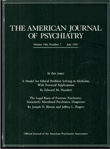Cognitive impairment in schizophrenia
Abstract
The cognitive functioning of 62 schizophrenic subjects was compared with that of 42 normal controls using neuropsychological tasks that included assessment of soft neurological signs, an aphasia screening test, tachistoscopic stimulation, auditory threshold determinations, and items from the Mini-Mental State, Halstead-Reitan, and Luria- Nebraska batteries. Performance was rated blindly for hemispheric, regional cortical, and global impairment. No control showed more than a mild deficit, whereas three-quarters of the schizophrenic patients exhibited moderate to severe dysfunction. Schizophrenic subjects differed significantly from controls on all measures and showed bilateral impairment that was comparatively worse in the dominant frontotemporal regions. These differences were not a function of age, sex, handedness, or drug administration.
Access content
To read the fulltext, please use one of the options below to sign in or purchase access.- Personal login
- Institutional Login
- Sign in via OpenAthens
- Register for access
-
Please login/register if you wish to pair your device and check access availability.
Not a subscriber?
PsychiatryOnline subscription options offer access to the DSM-5 library, books, journals, CME, and patient resources. This all-in-one virtual library provides psychiatrists and mental health professionals with key resources for diagnosis, treatment, research, and professional development.
Need more help? PsychiatryOnline Customer Service may be reached by emailing [email protected] or by calling 800-368-5777 (in the U.S.) or 703-907-7322 (outside the U.S.).



